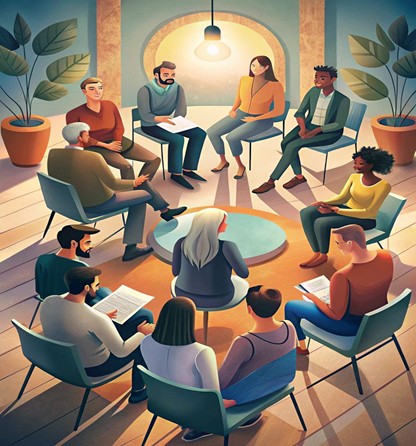The Power of Listening

Let’s be honest, when someone says, “you need to listen better”, it sounds simple. Too simple. But the truth is, real listening is a skill most people don’t fully learn, yet it’s one of the most powerful tools we have, no matter what kind of work we do.
Whether you’re a researcher, a teacher, a nurse, a manager, a community worker, or a business owner, how well you listen affects everything from how people respond to you to the quality of your work and the trust you build with others.
So, what does real listening look like?
It’s not just nodding or staying quiet while someone else talks. Real listening is active. Intentional. Focused. It means:
- Paying full attention without thinking of your reply
- Picking up on tone and body language
- Asking follow-up questions that show you care
- Being present, even if you disagree with what’s being said
And here’s the part many forget: People can feel when they’re truly being heard. Those feelings build trust, and trust opens doors.
Why it matters (no matter your job)
In research:
When I work with community members during field studies, I’ve learned that people open up more when they feel listened to, not just questioned. That’s when you hear what’s going on in their lives. The most valuable data I’ve collected came from simple conversations where someone felt safe enough to speak honestly.
In community work:
You can’t support people unless you understand their needs. And you can’t understand their needs unless you listen without assumptions. People don’t always say things directly, especially when they’re unsure if you care. Listening closely helps you hear the meaning behind the words.
In business and leadership:
Employees leave jobs not because of tasks, but because they feel unheard. Customers don’t come back when they feel ignored. The best managers and business owners know that listening to feedback, even uncomfortable feedback, leads to better decisions and stronger teams.
In education and health:
Students, patients, and clients all need to feel seen. A teacher who listens deeply creates a safe classroom. A nurse who listens fully can catch something a medical form might miss. Listening improves outcomes.
Even in tech or AI:
We’re now designing systems that listen. But how can we do that well if we, as humans, haven’t mastered the skill ourselves?
Common mistakes we make
Even with good intentions, we all fall into these traps:
- Listening to reply, not to understand
- Interrupting with “I know” or “same here” before the person finishes
- Looking at our phones while someone is talking
- Jumping into solutions instead of asking questions first
We miss what people are saying when we do this. And sometimes, the thing left unsaid was the most important part.
How to become a better listener (yes, you can train it)
Like any skill, listening takes practice. Here are simple ways to get better:
- Put away distractions, close the laptop, and put your phone down
- Let there be silence, don’t rush to fill it; silence helps people open up
- Repeat what you heard. So, what I’m hearing is…” helps you confirm you understood
- Ask more “how” and “what” questions they invite deeper sharing
- Listen with your eyes, too; body language matters just as much as words
And this might sound obvious, but it’s worth saying: show that you care. When people feel safe, they speak more honestly.
A moment that changed how I listen
I once sat with a woman who had been quiet through an entire group session. At the end, I gently asked if she had anything she wanted to share. She looked at me and said, “You’re the first person who looked at me like I matter.”
That stuck with me.
It reminded me that listening isn’t just about information. It’s about connection. And connection is what makes our work any work, matter.
We live in a world where everyone wants to speak, post, explain, and be heard. But the ones who make the biggest difference? They listen first.
So, whether you’re leading a team, talking to clients, supporting a community, or just trying to be a better friend or colleague, start by listening more deeply.
You’ll be surprised how much changes people feel when they truly hear.
This Blog may interest you as well, about Bullying and how it affects us in a long run https://thebenitalk.com/understanding-bullying-why-it-happens-and-how-we-can-stop-it/



